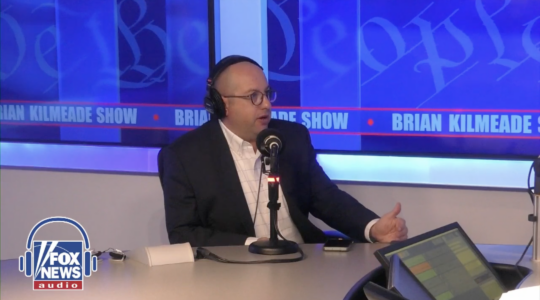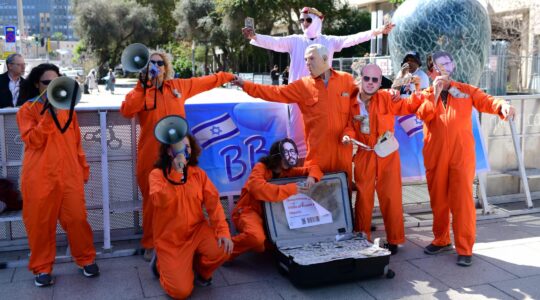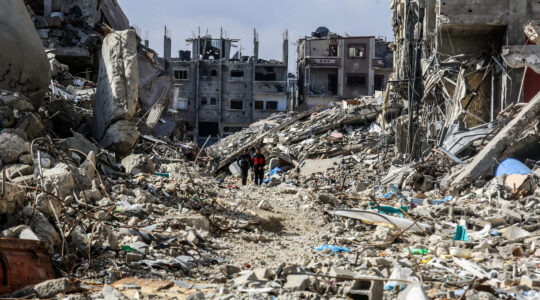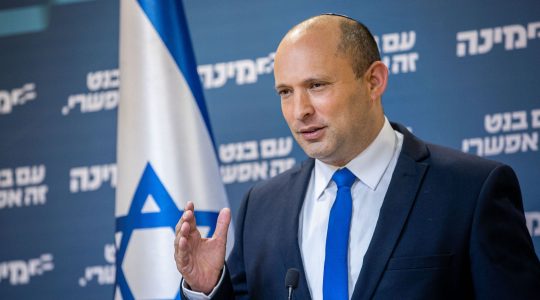JERUSALEM (JTA) — Hanging over his desk, Nir Barkat keeps a large framed photograph of himself running the Jerusalem half-marathon. The city’s new mayor is quick to remind a visitor he also runs full marathons.
That’s good: He’s going to need the perseverance of a long-distance runner to pull off his ambitious plan to save Jerusalem.
Though Israel’s capital and one of the world’s oldest and most revered cities, Jerusalem is also the poorest city in Israel, with high housing prices, a shrinking non-Orthodox population and a dwindling middle class.
In an interview with JTA at his office atop the municipal building, Barkat expounded on his plans to revitalize Jerusalem.
Boyish looking at 49, Barkat cuts an earnest figure in a charcoal gray suit, sky blue Oxford shirt and no tie. The former paratrooper, who made millions in high-tech, has been in office for three months after defeating Meir Porush, a veteran fervently Orthodox politician, and others.
Secular and Modern Orthodox Jerusalemites greeted his election with great hope, thinking Barkat might be able to lift the city from its current rut. (Most Arab residents boycotted the election, as they do most years, in protest of Israeli sovereignty over the city).
Barkat will be traveling next week to the United States, where he hopes to reach out to American Jews and make them partners in revitalizing Jerusalem. To use his language, he sees them as “shareholders” in the city.
“I know there is not one Jew who does not care about the future of Jerusalem, and what I propose is a partnership,” he said.
Barkat’s plan is to create special economic zones in Jerusalem that are focused on two clusters — one called culture-tourism, the other health and life sciences. He will make his pitch in visits to New York, Boston, Los Angeles, Washington, San Francisco and Florida.
Barkat is hoping Diaspora Jews will be investment partners in joint business ventures. For example, he says, Jews in Los Angeles might invest in Jerusalem’s fledgling film industry, and biotech engineers in Boston might invest in biotech in a city that hosts Hadassah Hospital and the prestigious Hebrew University.
The global financial crisis is no deterrent, he says.
“I believe in the short term it will be more of a challenge because people have less than they had in the past or less than they want, but I’m not talking about short term,” Barkat told JTA. “I want to build relationships. It’s the way we do business together.”
So far, Barkat’s aggressive approach to his job has received mixed response.
He tussled verbally with visiting U.S. Secretary of State Hillary Rodham Clinton earlier this month over his plan to demolish some 80 Arab houses in the neighborhood of Silwan, just outside the walls of the Old City, to make way for an archeological park. Clinton called his plan “unhelpful” and a violation of peace efforts, while Barkat dismissed the criticism as based on “disinformation.”
The dispute is one of Barkat’s first tests as mayor.
The neighborhood slated for demolition is comprised of houses built illegally by Palestinian residents of Jerusalem on land that had been set aside 20 years ago as open green space for an archeological garden.
Under three previous city administrations the houses were never removed, but recently the development plans for a park were revived.
Critics of the plan claim the issue is about politics. Not only will it displace some 1,000 Arab residents, they say, but it’s part of a wider, ideologically motivated plan to secure the future of a united, Jewish Jerusalem in negotiations with the Palestinians.
Barkat rejects such criticism, saying anyone uprooted will be relocated and that Arabs and Jews have the legal right to live anywhere they wish in the city. That would include Silwan, where several dozen Jewish families in recent years have moved into the largely Arab area.
“If you have a group of people trying to plan housing in Central Park, what do you think Mayor Bloomberg would do?” Barkat asked rhetorically. “And this park has more importance than Central Park because of its historical significance.”
As to the relationship between municipal and national government, Barkat said he foresees a good working relationship with Prime Minister-designate Benjamin Netanyahu and his staff.
“I know the people, and I believe they want to develop and improve Jerusalem,” the mayor said. “There is good chemistry.”
Barkat hopes the new government will provide a stimulus package for the city, which previous governments have promised but never delivered.
To keep the young and middle class in Jerusalem, Barkat is hoping his economic cluster zones will bear fruit and that more jobs in high tech, life sciences, tourism and culture will keep people in Jerusalem.
“When you make Jerusalem a special economic zone, it will start raining on everyone and with more jobs the city comes out of its poverty,” Barkat said.
He also has called for construction of more affordable housing, not just the luxury projects aimed at Diaspora Jewish buyers with money that have been predominant in recent years. Barkat wants the absentee Diaspora homeowners to rent their apartments inexpensively to local university students.
“You own an apartment, you subsidize students, help the economy and decrease the price of other apartments,” he said with his trademark smile. “It’s a classic win-win.”
JTA has documented Jewish history in real-time for over a century. Keep our journalism strong by joining us in supporting independent, award-winning reporting.





